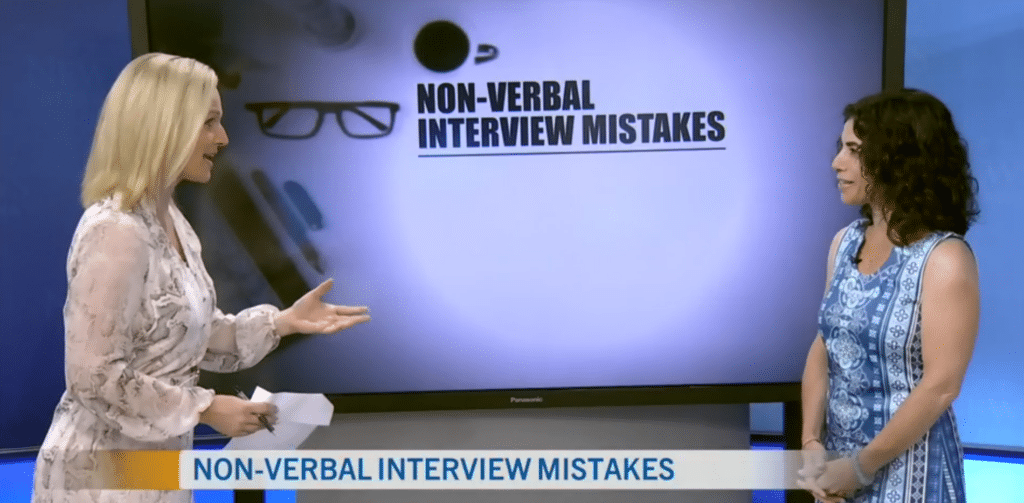You’ve received that coveted call for a job interview and now you are taking time to prepare some solid answers to possible interview questions so that you can land the job – but you’re missing one key component. Your verbal responses, although incredibly important, aren’t the only things hiring managers are paying attention to in a job interview. There are non-verbal cues that can still impact your chances at getting hired. From the moment you walk into the room, you want to put your best foot forward to show why you’re the best candidate for the job. Taking the time to evaluate some of the non-verbal cues that you give off is very important.
Here are some common non-verbal interview mistakes
1. Not looking the interviewer in the eye
If you’re looking down throughout most of your interview, or your focus is moving around the room, it’s more difficult for an interviewer to feel like they’re really connecting with you. It also gives the impression that you’re bored or uninterested. Maintaining eye contact with the people you’re talking to shows that you’re an engaged, active participant in the conversation and helps convey that you are confident in what you’re saying. However, it is not advised to turn the interview into an uncomfortable staring contest. You can look away at moments, like looking down at your notepad, or resume, or any work examples you may have to keep the conversation natural. But try not to look away when you’re responding to a question during an interview.
2.Lots of fidgeting
Interviews can be nerve-racking, which may bring up some anxious ticks, but try to keep any unwanted movement to a minimum. Some of the gestures commonly associated with nervousness include spinning in your chair, biting your nails, playing with your hair or touching your face. The more of these things you do during an interview, the more likely it is that you are giving the impression that you are not confident, and it can also be distracting for the interviewer. In the days leading up to your interview, be mindful of the fidgeting you do when you get a bit stressed or nervous, and try to practice supressing it as much as you can. You also might want to practice interviewing with a friend, or colleague and have them provide open and honest feedback.
3. Aggressive gestures
If you’re naturally someone who speaks with their hands it isn’t necessarily something you need to avoid in an interview, but be aware of the gestures you are making. You will want to avoid actions like pointing at the interviewer, snapping your fingers, crossing your arms or slamming your hands on the table to make a point. Over-the-top gestures like these can make the interviewer feel uncomfortable and may come across as particularly aggressive.
4.Not dressing for the job
Depending on the job you are applying for, and the company you’re interviewing with, dressing appropriately does not necessarily mean that a full suit is required, however it also does not imply that your casual weekend-wear is appropriate either. If you are going to an interview at a corporate office, you will want to show up in more formal attire to show that you have an understanding that you’re applying for a job in a more reserved environment. If the company you want to work for is more casual with their dress code, or maybe doesn’t have one at all, you still want to look professional and polished, maybe swapping a blazer for a golf shirt or a clean blouse. Dressing for interviews in the summer months can be particularly challenging. Even though the hot weather might entice you to wear shorts, a tank top and flip flops, it might be better to leave those items at home to change into once the interview is done. Always make sure your clothing is clean and appropriate, and that you feel confident in your outfit from head to toe.
5. Not smiling
On a basic level, you want to show the interviewer that you are happy to be there and the easiest way to convey that is by smiling. This doesn’t mean you need to plaster a giant grin on your face the whole time, but smile when you first walk into the room and say hello, and maintain a comfortable smile as you listen to the questions and move through your answers during the interview. This is going to reinforce your interest and excitement about the job you’re trying to get.
Even though interviews are important, and small non-verbal cues can make a significant impact, you want to make sure that you are as calm, relaxed and natural as possible. Interviewers are looking to get a sense of your personality and you want to make sure that your verbal and non-verbal impression reinforce why you should get the job. It’s important to not only be confident in what you’re saying, but also in the way you present yourself.
